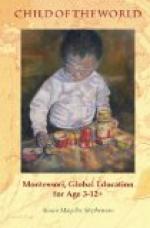It was spring. The flax was in full bloom, and it had dainty little blue flowers that nodded in the breeze.
“People say that I look very well,” said the flax. “They say that I am fine and long and that I shall make a beautiful piece of linen. How happy I am! No one in the world can be happier.”
“Oh, yes,” said the fence post, “you may grow and be happy, and you may sing, but you do not know the world as I do. Why, I have knots in me.” And it creaked;
“Snip, snap, snurre,
Basse, lurre,
The song is ended.”
“No, it is not ended,” said the flax. “The sun will shine, and the rain will fall, and I shall grow and grow. No, no, the song is not ended.”
One day some men came with sharp reap hooks. They took the flax by the head and cut it off at the roots. This was very painful, you may be sure.
Then the flax was laid in water and was nearly drowned. After that it was put on a fire and nearly roasted. All this was frightful. But the flax only said, “One cannot be happy always. By having bad times as well as good, we become wise.”
After the flax had been cut and steeped and roasted, it was put on a spinning wheel. “Whir-r-r, whir-rr-r,” went the spinning wheel; it went so fast that the flax could hardly think.
“I have been very happy in the sunshine and the rain,” it said. “If I am in pain now, I must be contented.”
At last the flax was put in the loom. Soon it became a beautiful piece of white linen.
“This is very wonderful,” said the flax. “How foolish the fence post was with its song of—
’Snip, snap, snurre,
Basse, lurre,
The song is ended.’
The song is not ended, I am sure. It has only just begun.
“After all that I have suffered, I am at last made into beautiful linen. How strong and fine I am, and how long and white! This is even better than being a plant bearing flowers. I have never been happier than I am now.”
After some time the linen was cut into pieces and sewed with needles. That was not pleasant; but at last there were twelve pretty white aprons.
“See,” said the flax, “I have been made into something. Now I shall be of some use in the world. That is the only way to be happy.”
II
Years passed by, and the linen was so worn that it could hardly hold together.
“The end must come soon,” said the flax.
At last the linen did fall into rags and tatters; it was torn into shreds and boiled in water. The flax thought the end had come.
But no, the end was not yet. After being made into pulp and dried, the flax became beautiful white paper.
“This is a surprise, a glorious surprise,” it said. “I am finer than ever, and I shall have fine things written on me. How happy I am!”
And sure enough, the most beautiful stories and verses were written upon it. People read the stories and verses, and they were made wiser and better. Their children and their children’s children read them, too, and so the song was not ended.




